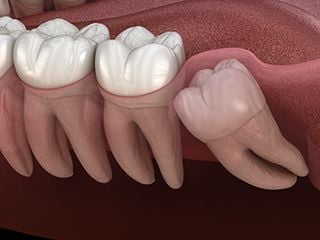 Wisdom teeth are the third molars in your mouth and the last permanent teeth to erupt. They typically appear between the ages of 17 and 25. For the lucky few, some never develop wisdom teeth or they erupt normally and cause no issues. For others, they experience what is called impacted wisdom teeth, which can cause a variety of problems in your mouth.
Wisdom teeth are the third molars in your mouth and the last permanent teeth to erupt. They typically appear between the ages of 17 and 25. For the lucky few, some never develop wisdom teeth or they erupt normally and cause no issues. For others, they experience what is called impacted wisdom teeth, which can cause a variety of problems in your mouth.
Complications of Impacted Wisdom Teeth
- Higher risk for tooth decay: Wisdom teeth are more difficult to clean because of the position in which they erupt. Food and bacteria stay trapped between the gum and the impacted tooth, no matter how thoroughly you brush.
- Overcrowding and damage to surrounding teeth: If your wisdom tooth applies force against the second molar as it erupts, damage can be done to the second molar, which increases the risk of infection. The pressure from your wisdom tooth can also cause overcrowding of the other teeth or cause an abnormal bite to form, which will require orthodontic treatment to fix. For some, the jaw is simply too small to accommodate all the teeth.
- Cyst developing in the jawbone: There is a sac in the jawbone in which the wisdom tooth develops. The sac can fill with fluid, forming a cyst that can cause damage to the jawbone, teeth, and nerves. In some serious cases, a benign tumor may even form. At this point, removal of tissue and bone might be necessary.
- Higher risk of developing gum disease: Since thorough dental hygiene is more difficult with wisdom teeth, there’s an increased risk of developing pericoronitis, a painful and inflammatory gum condition.
Before the Procedure
It’s understandable to feel anxious about extracting your wisdom teeth, but it’s best for them to be removed in order to avoid headaches and consistent pain in the back of your mouth. It is best to have your wisdom teeth removed as soon as they begin to develop. When you’re young, the wisdom teeth roots aren’t yet fully developed. This makes the procedure a bit easier on your surgeon and helps with a quicker recovery time. Before making a decision to remove wisdom teeth, your dentist will first assess your mouth and take X-rays.
After the Procedure
Your surgeon will provide you with post-operative instructions. You will be advised to eat soft foods for a few days and clean out the extraction site after each meal. A syringe will be provided for you to fill with water and flush out any food particles stuck at the extraction site. This is the best way to prevent alveolar osteitis, also known as dry socket. When a tooth is removed from a healthy socket, blood clots form and the healing process begins. Dry sockets happen when the healing process is hindered in some way. If you notice any extreme pain or sensitivity after your procedure, you may have developed a dry socket. This condition requires immediate treatment by your dentist.
